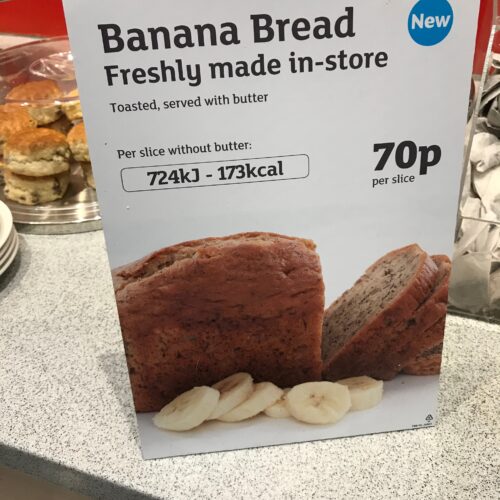Friday’s image is via Sainsbury’s with their impressive predicting of the future with their food waste reducing in store produced Banana Bread, long before it was made famous by lockdown 1 in March 2020.
Banana Bread in Sainsbury’s – long before COVID inspired lockdown.
The addition of the banana bread in Sainsbury’s was introduced long before it was made famous by every man, woman and child producing oceans of Banana Bread to while the hours away in lockdown 1, back in March/April/May 2020.
The issue of food waste by supermarkets continues to be a challenge but in recent years, this has been outflanked significantly by efforts to reduce plastic, alongside the wider net zero considerations around emissions too.
Indeed, emissions are reduced by Sainsbury’s due to the re-use of waste products to fuel their delivery vehicles, with conversion plants installed at their depots to capture waste product and change its use to bio-diesel.
A noble effort.
Process getting in the way of reducing food waste?
Wider food waste initiatives have always been fraught with challenge of course and it really is abhorrent to think of families struggling to feed themselves, at any point, whilst supermarkets threw food away for all manner of reasons. Even appearance.
It’s a good example of where the process did get in the way of the right thing for customers, with the obvious barrier to ‘giving food away’ or similar. Bagging various loose items up in bag for a token amount sounds great, but the reality is, it wreaks havoc with the produce inventory which can then harm the availability of product.
Process prohibited lots of initiative which isn’t great. Even internally – various steps to use those Bananas (which are past their best and but ok for the bread) will be required internally, scanning them from the Produce department and in to the Bakery so it can be costed accurately.
Indeed, there remains other opportunities to transfer stock and make use of it in other product, but various steps are required and often, there isn’t the ambition for anyone to progress something that delivers zero to profit and makes virtually no impact on sales, either.
Opportunity (doesn’t) knock to reduce waste.
Opportunities have been reduced in recent years with the closure of various fresh food counters which in turn means the ability for a retailer to utilise their skill in store to make product to save waste is sorely limited and in some cases, impossible.
There is never a business case to keep a scratch bakery in play because of the fact they can use the Bananas to make Bread, but it’s just one example of a story that can be told to the customer.
Rather than it being a sea of plastic over and over, with little movement in anything year on year. It’s often more bake off from frozen product than hand crafted scratch product anyway!
WIth Asda closing their bakeries, their ability to offer anything like this is eliminated and Tesco, although they have a hybrid model of Bakery, with some bake off entirely, others having a machine that calls the shots and others that are full scratch. It appears likely they’re going one way, not the other with this.
Sainsbury’s and Morrisons retain their scratch bakeries (Morrisons far more than Sainsbury’s) and thus have an opportunity to drive scarcity for good and turn products that are perhaps past their peak, in to products that offer genuine interest and will drive both awareness, and interest to the stores themselves.
Regs are regs
However, regs are regs (as Supt Hastings would say) and the guidelines around food production are difficult to overcome, especially with the need to be flexible based on the abundance of stock that any individual store may have.
So donating to food banks, turning to bio fuel, “magic bags” and other such ideas look to be the future, although not wasting food in the first place is naturally, the common goal.
Flexibility is needed (even spoiling fruit but good for smoothies) is beyond the realms of possibility given the tight regulation. Understandable. But when retailers talk about being entrepreneurial and behaving like a start up, looking to be fleet of foot etc.

